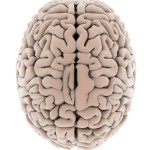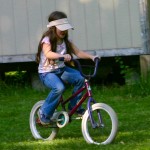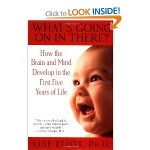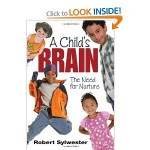Top 10 Q&A about Child’s Brain Development — Brain Health Series Part 1
 A child’s brain is a perfect example of neuroplasticity: As the child learns basic and complex skills, his or her brain changes, connections between neurons are strengthened or eliminated.
A child’s brain is a perfect example of neuroplasticity: As the child learns basic and complex skills, his or her brain changes, connections between neurons are strengthened or eliminated.
Here are 10 top questions and answers to explore the developing brain and get a better window on young minds. Following the Q&A find related relevant resources (links, documentaries, and books) to go further.
.
10 questions and answers about a child’s brain development
Q: Does brain development depend only on genes?
A: No, brain development is the result of a complex interaction between both genes and environment. Brain development begins in utero. Billions of neurons are generated. They migrate from their birthplace in the embryo to their final positions. Axons and dendrites grow and connections (synapses) between neurons are  formed. These mechanisms are believed to be hardwired, that is determined by genetics. Once connections are formed, activity-dependent mechanisms come into play. Whether a connection is strengthened or eliminated will be determined by the activity of this connection, that is, it will depend on the experiences of the baby/child. (Click here for a refresher on Brain basics: What is a neuron, a synapse, etc.)
formed. These mechanisms are believed to be hardwired, that is determined by genetics. Once connections are formed, activity-dependent mechanisms come into play. Whether a connection is strengthened or eliminated will be determined by the activity of this connection, that is, it will depend on the experiences of the baby/child. (Click here for a refresher on Brain basics: What is a neuron, a synapse, etc.)
An example of how the environment can influence brain development: Rutter et al. (1998) studied Romanian orphans brought to England and adopted before age two (some before 6 months). When assessed on arrival, the babies were shown to be severely developmentally impaired and malnourished. When tested again after several years in the adoptive environment (at age 4), the children showed great physical and developmental progress, especially those adopted before 6 months.
.
In this other interview, ex-child prodigy Joshua Waitzkin’s, American chess player, martial arts competitor, and author, explains how a lot depends on learning about learning.
.
Q: Are babies born with more or with less neurons and synapses than adults?
A: Babies are born with more neurons and thus synapses than adults. In a study conducted in 2007, Abitz, Damgaard et al. compared 8 newborn human brains with those of 8 adult brains and showed that on average, adult neuron estimates were 41% lower than those of the newborn. What happens to these extra neurons and connections then? The answer is synaptic pruning (or neuron pruning).
Synaptic pruning is a regulatory process that reduces the overall number of overproduced neurons by “weeding out” the weaker synapses. A weak synapse is a synapse that is not used much, which shows that experience is an essential part of brain development.
.…
Q: Is under 5 THE ONLY critical period for brain development?
A: No. Brain development is a continuum from birth to age 20 or so. A “critical period” in development is a time, in the early stages of an organism’s life, during which the organism shows a very high sensitivity to some stimuli in the environment. If the stimuli in the environment are present, the organism will develop in a specific way. If the stimuli are not present during the critical period, it may be difficult, or sometimes impossible, to develop some functions. For example, if an infant does not see light during the first few months of life (at least 6 months), nerves and neurons processing visual input will degenerate and eventually die.
 The most well-know example of critical period comes from the Critical Period Hypothesis (Lenneberg, 1967), which states that the first few years of life constitute the time during which language develops easily. After that learning a language is more difficult and usually less successful.
The most well-know example of critical period comes from the Critical Period Hypothesis (Lenneberg, 1967), which states that the first few years of life constitute the time during which language develops easily. After that learning a language is more difficult and usually less successful.
Is it the case however that “everything happens before age 5”? Would age 0–5 be a critical period for all major cognitive skills? No. Development is more a trajectory, a continuum. Brain imaging studies and other research show that the brain is not fully developed until age 18 to 20. In particular, the frontal lobes of the brain — the part involved in judgment, organization, planning and strategizing – are the last ones to be wired to function like an adult.
.
Q: What does playing bring to a child?
Q: What is the effect of music on a child’s brain?
A: Does listening to Mozart make children smarter? It turns out that in spite of the publicity it received the so-called Mozart effect is supported by very little scientific evidence. However learning how to make music can have positive long-term changes on the brain. Music instruction may boost specific skills that are directly related to music such as fine motor skill but also increase more general skills such as working memory. (See What is working memory? for more information on this cognitive skill.)
.
Q: What is the effect of video games on a child’s brain?
To go further in understanding a child’ brain:
Resources
- PBS: The child’s brain
- Dana Foundation: Fun games and activities for kids
- Neuroscience for kids: Learn fun facts about the brain (good read for adults too!)
- PBS: Summary of the cognitive steps and milestones expected between the ages of 1 and 8.
- ‘Five-minute scan’ to check child’s brain development (BBC News, 2010)
- Speech and Language milestones (NIH, 2000)
- TV and Kids under age 3 (PBS)
Books
 The Scientist in the Crib: What Early Learning Tells Us About the Mind by Alison Gopnik, Andrew N. Meltzoff and Patricia K. Kuhl (2000). Harpers Paperbracks.
The Scientist in the Crib: What Early Learning Tells Us About the Mind by Alison Gopnik, Andrew N. Meltzoff and Patricia K. Kuhl (2000). Harpers Paperbracks.
.
.
 What’s Going on in There? : How the Brain and Mind Develop in the First Five Years of Life by Lise Elliot (2000). Bantam Books.
What’s Going on in There? : How the Brain and Mind Develop in the First Five Years of Life by Lise Elliot (2000). Bantam Books.
.
.
 A Child’s Brain. The Need for Nurture by Dr. Robert Sylwester’s (2010). Corwin.
A Child’s Brain. The Need for Nurture by Dr. Robert Sylwester’s (2010). Corwin.
Read an excerpt here
.
.
—————-
Keep learning in the second part of our series: The Adolescent Brain (to be published in December). Do not miss it: Subscribe to our free monthly Brain Fitness e‑newsletter!
.
.





I would like to know whether mother’s behaviour during pregnancy will matter for a child’s development…
I’m not exactly sure what you mean by “behaviour” — how she acts, what she learns, etc.? I don’t believe that what the mother learns or knows or studies would affect what the baby learns, knows or studies.
If you’re talking about steps that the mother can take to “teach” the baby in utero, Dr. Al Sutton of Barry University talked about gently tapping a pregnant mother’s stomach when the baby kicked, and developing patterns of taps. He discovered that if done consistently, the baby learned — in utero — to actually respond to the taps.
Moreover, it is a given that a mother’s lifestyle will definitely impact a baby’s health and development. Exposure to cigarette smoke, alcohol, and drugs have proven negative effects on the baby.
In addition, exposure to environmental toxins — lead, mercury, pesticides, household cleaners etc. — also will be detrimental to the baby’s health.
Diet, exercise and stress will impact a baby’s development, as well. For example, essential fatty acid deficiencies in the mother can affect the baby, and a mother’s weak immune system may also prove to be an issue for the baby. (There are some posts about nutrition and it’s effects on cognition and development at http://sparkdevelopment.blogspot.com/).
Hope this helps!
Such a detailed post. The ten questions could really be helpful to figure out a child’s brain activity. Of course a mothers behavior could affect the child. A new study in rats at the University of Haifa reveals Trauma experienced by a mother even before pregnancy will influence her offspring’s behavior.